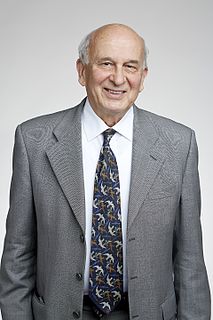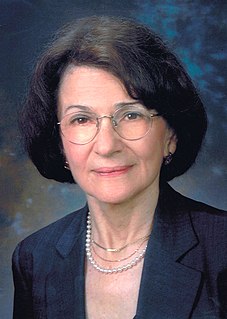The International Prize (French: Prix International) of the Fyssen Foundation is a science award that has been given annually since 1980 to a scientist who has conducted distinguished research in the areas supported by the foundation such as ethology, palaeontology, archaeology, anthropology, psychology, epistemology, logic and the neurosciences. [1]
The Fyssen Foundation is a French charitable organization that was established and endowed in 1979 by H. Fyssen. The aim of the foundation is to stimulate research into the processes underlying and leading to cognition, including work in such disciplines as ethology, paleontology, archaeology, anthropology, psychology, logic, and neuroscience. To this end, the foundation offers postdoctoral stipends to French scientists wanting to do research abroad and foreign scientists wishing to work in a French laboratory. Reports on this research are published in the foundation's journal, the Annales de la Fondation Fyssen. It also offers research grants. In addition, the foundation regularly organizes symposia and supports the publication of the proceedings thereof. Finally, the foundation yearly awards an International Scientific Prize. The topics of this prize rotate among the different fields of interest to the foundation.

Ethology is the scientific and objective study of animal behaviour, usually with a focus on behaviour under natural conditions, and viewing behaviour as an evolutionarily adaptive trait. Behaviourism is a term that also describes the scientific and objective study of animal behaviour, usually referring to measured responses to stimuli or trained behavioural responses in a laboratory context, without a particular emphasis on evolutionary adaptivity. Many naturalists have studied aspects of animal behaviour throughout history. Ethology has its scientific roots in the work of Charles Darwin and of American and German ornithologists of the late 19th and early 20th century, including Charles O. Whitman, Oskar Heinroth, and Wallace Craig. The modern discipline of ethology is generally considered to have begun during the 1930s with the work of Dutch biologist Nikolaas Tinbergen and by Austrian biologists Konrad Lorenz and Karl von Frisch, joint awardees of the 1973 Nobel Prize in Physiology or Medicine. Ethology is a combination of laboratory and field science, with a strong relation to some other disciplines such as neuroanatomy, ecology, and evolutionary biology. Ethologists are typically interested in a behavioural process rather than in a particular animal group, and often study one type of behaviour, such as aggression, in a number of unrelated animals.
Archaeology, or archeology, is the study of human activity through the recovery and analysis of material culture. The archaeological record consists of artifacts, architecture, biofacts or ecofacts and cultural landscapes. Archaeology can be considered both a social science and a branch of the humanities. In North America archaeology is a sub-field of anthropology, while in Europe it is often viewed as either a discipline in its own right or a sub-field of other disciplines.





